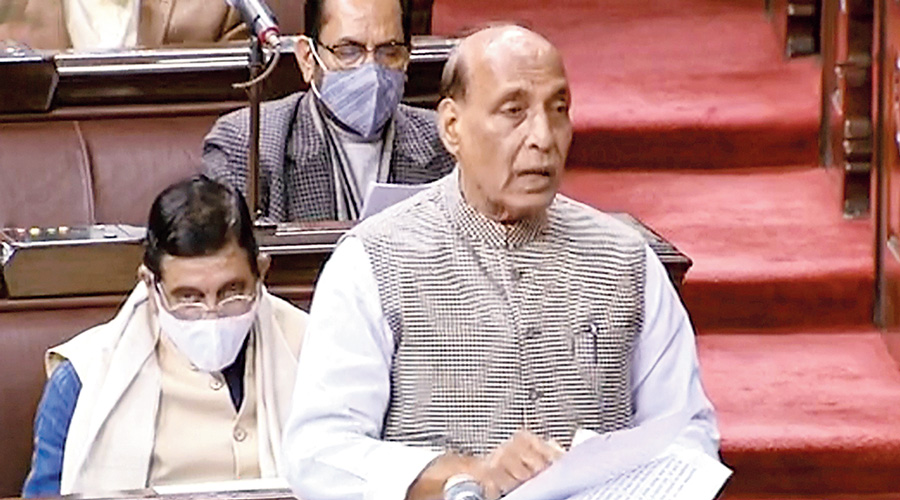
Centre to Parliament: India, China disengagement begins - under an agreed process that stipulated neither would patrol its traditional areas till the modalities had been worked out
Chairman M. Venkaiah Naidu said ‘talks are still on’

India broke its silence on the disengagement process in the Rajya Sabha a day after the Chinese defence ministry spokesperson announced that the two countries’ frontline troops had begun a “synchronised and organised disengagement from February 10” at the southern and northern banks of the Pangong Lake.
The government’s silence till Thursday morning was attributed to the need to make important announcements first in Parliament when the national legislature was in session.
Presenting a statement, defence minister Rajnath Singh said: “The agreement that we have been able to reach with the Chinese side for disengagement in the Pangong Lake area envisages that both sides will cease their forward deployments in a phased, coordinated and verified manner.”
He added: “The Chinese side will keep its troop presence in the north bank area to east of Finger 8. Reciprocally, the Indian troops will be based at their permanent base at Dhan Singh Thapa Post near Finger 3. A similar action would be taken in the south bank area by both sides.”
Describing these as “mutual and reciprocal steps”, Rajnath said the structures built by either side since April in the north and south bank areas would be removed and the landforms restored.
He said the two sides had agreed to a temporary moratorium on military activities in the north bank, including patrolling in the traditional areas. Patrolling will resume only after both sides have reached an agreement in their diplomatic and military talks.
Rajnath said that within 48 hours of the completion of disengagement in the Pangong Lake area, senior commanders will meet to address and resolve all remaining issues.
He did not identify the remaining issues, but these should include the disputes over Depsang and Demchok besides the Galwan Valley, prised open by the Chinese last summer after having remained a settled issue since the 1962 war.
Rajnath sought to assure the House that India had not conceded anything under the agreement.
Opposition members sought clarifications, permitted by the Rules of Procedure of the Rajya Sabha, but Chairman M. Venkaiah Naidu disallowed them. He cited national security and emphasised that the negotiations with the Chinese were still on.
Congress member Jairam Ramesh reminded Naidu of his direction to Rajnath in the last session to organise an in-camera briefing for party leaders on the situation along the Line of Actual Control.
Naidu said Rajnath had been in touch with him on this and that they had decided to wait a while before having the in-camera briefing. He said this had been communicated to some of the party leaders.


0 Response to "Centre to Parliament: India, China disengagement begins - under an agreed process that stipulated neither would patrol its traditional areas till the modalities had been worked out "
Post a Comment
Disclaimer Note:
The views expressed in the articles published here are solely those of the author and do not necessarily reflect the official policy, position, or perspective of Kalimpong News or KalimNews. Kalimpong News and KalimNews disclaim all liability for the published or posted articles, news, and information and assume no responsibility for the accuracy or validity of the content.
Kalimpong News is a non-profit online news platform managed by KalimNews and operated under the Kalimpong Press Club.
Comment Policy:
We encourage respectful and constructive discussions. Please ensure decency while commenting and register with your email ID to participate.
Note: only a member of this blog may post a comment.